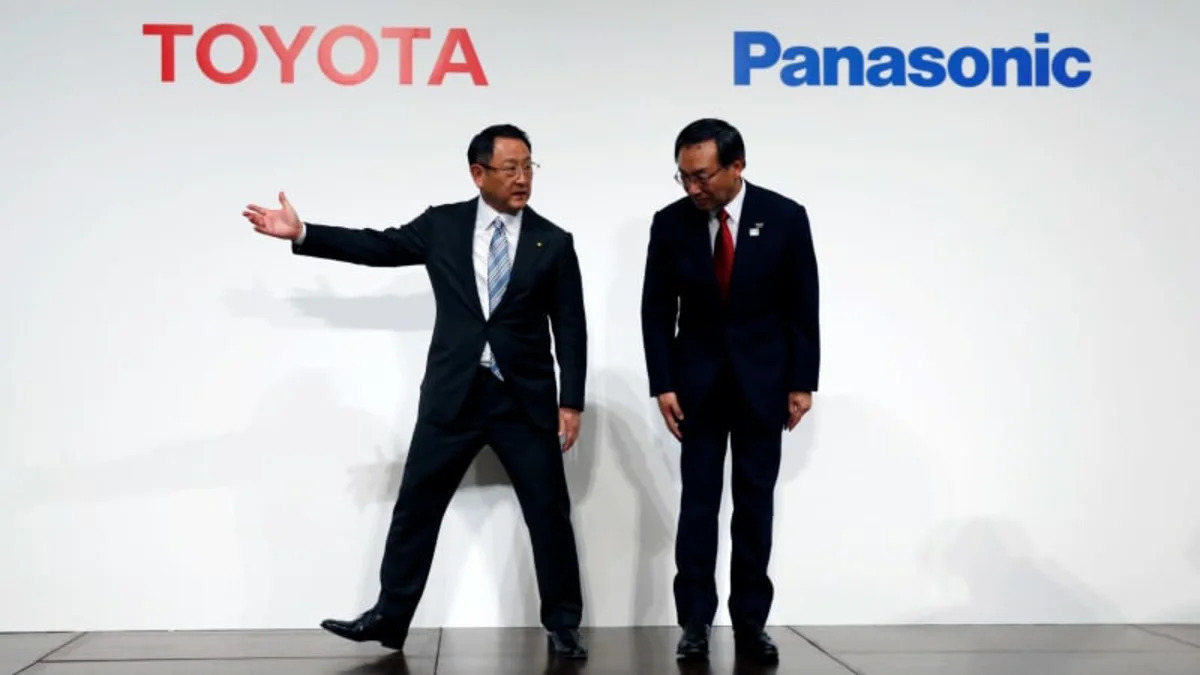TOKYO — Toyota is considering making batteries for electric vehicles with Panasonic, as it ramps up battery development to help meet its goal for green cars to comprise half of its global sales by 2030.
The joint announcement on Wednesday builds on an existing agreement under which Panasonic — a global market leader for automotive lithium-ion batteries — makes batteries for Toyota's gasoline-electric and plug-in hybrid vehicles.
The plan to co-operate more closely on batteries comes as automakers compete to develop more EVs in compliance with tightening regulations worldwide to reduce vehicle emissions.
Toyota has previously announced that it plans to bring a car to market with potentially revolutionary solid-state batteries by 2022. No word on whether Panasonic has a role in that initiative.
Toyota's battery needs are likely to increase after it said last year it would add fully electric vehicles to its product lineup in the early 2020s, expanding a green-car strategy which has focused on plug-in hybrid and fuel-cell vehicles (FCV).
But Toyota, which has previously focused on hybrids and hydrogen fuel cells, is having to play catch-up on pure EVs. Last month, Toyota Chairman Takeshi Uchiyamada was quoted as saying battery-powered cars are not ready for mass production yet. "Battery-powered cars with a long range are very expensive and it takes a long time to charge them," he was quoted as saying by Der Spiegel. "Such cars do not fit in our program."
Announcing the Panasonic alliance, Toyota President Akio Toyoda said, "The auto industry faces many hurdles to developing next-generation batteries which are difficult for automakers or battery makers to tackle on their own.
"It would be difficult for us to meet our 2030 goals given the current pace of battery development. That's why we're looking to Panasonic and other companies to help us develop ever-better cars and batteries."
Toyoda said the automaker's annual sales target for petrol-electric and plug-in hybrids is 4.5 million vehicles by 2030, and 1.0 million units for EVs and FCVs.
To that end, Toyota in September formed an EV technology venture with peer Mazda and supplier Denso Corp. The venture reflects a trend of automakers and components makers partnering to develop the next-generation cars, to reduce research, development and manufacturing costs.
In Panasonic, Toyota is partnering with the main battery supplier of major U.S. EV maker Tesla. With a 29 percent market share, Panasonic is the world's biggest supplier of batteries for plug-in hybrids and EVs, showed January-June data from Nomura Research.
The pair plan to expand development of prismatic — flat, pouch-shaped — batteries with higher energy density. Panasonic already makes prismatic batteries for Toyota, whereas for Tesla, it makes cylindrical batteries of a type similar to those used in laptops.
"Our cylindrical batteries are the most widely used batteries in pure EVs at the moment," said Panasonic President Kazuhiro Tsuga. "But when you look at the future, it's difficult to gauge which format holds more demand potential."
"We need to be able to develop new battery technologies in a prismatic format, and this would be difficult on our own."
Reporting by Naomi Tajitsu and Makiko Yamazaki
Related Video:


Sign in to post
Please sign in to leave a comment.
Continue